- Home
- Tim Powers
The Anubis Gates Page 16
The Anubis Gates Read online
Page 16
At least I made it to here and now alive, he told himself. There were moments when it looked like I wouldn’t. Knifed, shot at and nearly drowned on Saturday evening, and then captured by that gypsy later that night.
He smiled a little bewilderedly into his coffee as he remembered the encounter. He’d thanked Jacky and bidden the boy farewell—having agreed to meet at high noon on Friday at the middle of London Bridge—and was being introduced to Kusiak’s stable boss when the gypsy had hurried in, demanding to exchange three spent horses for three fresh ones. The stable boss had initially refused, but reconsidered when the gypsy impatiently produced a handful of gold sovereigns from a pouch and offered to throw them in. Doyle’s idle interest had turned to hollow-bellied fear when he recognized the man—this was the same gypsy that had watched with no sympathy when Doctor Romany had tortured him a week ago; Doyle quietly stepped back out of the circle of lamplight and turned to leave, but by the time he got to the side door the recognition had become mutual. Doyle ran down an alley and then dashed east along a sidewalk toward London Bridge, but the old gypsy was faster, and the running footsteps behind Doyle sounded louder and louder until a hand had clamped on his collar and he’d been thrown to the ground.
“Speak the first word of any spell, dog of the Beng, and I’ll bounce your head off this pavement,” the gypsy had said, crouching over him and hardly panting at all.
“Go ahead,” Doyle had gasped. “Christ, why can’t you people leave me alone?” He slowly got his breath back. “And if I knew any spells do you think I’d have run from you? Hell no, I’d have conjured up some damn kind of… winged chariot or something. And changed you into a pile of horse dung so I’d have had the pleasure of shovelling you onto a manure cart.”
To Doyle’s surprise the gypsy had grinned. “Hear that, monkey? Man wants to turn us to horse manure. Most of these magical chals try to turn things to gold, but old Wheezy here thinks small.” He’d yanked Doyle to his feet. “Come on now, Bengo, there’s a man wants to talk to you.”
A couple of people were leaning out of a back door Doyle had fled past, and one called an angry question, so the old gypsy had led him down a street away from the river and then turned right again so that they were approaching Kusiak’s front entrance. Doyle was walking ahead.
When they were passing the open door of a public house two buildings away from Kusiak’s, Doyle stopped. “If you’re taking me back to that lunatic who tried to burn my eye out last time,” Doyle said, a little unsteadily, “then I need two beers first. At least two. And since you’ve got all that gold, sport, you can buy ‘em.”
There was silence behind him for a moment, then the gypsy said, “It’s a kushto idea. Adree we go.”
They entered and walked through the high-ceilinged room where the bar was, to a smaller chamber two steps up where a lot of tables were set randomly across the wood floor. The gypsy rolled his dark eyes toward a table in the corner, and Doyle nodded and crossed to it and, sitting down, warmed his hands over the candle that sat on it.
When a girl had appeared and taken their order—beer for Doyle, wine for the gypsy—Doyle’s captor said, “They call me Damnable Richard.”
“Oh? Well, pleased to—no. Uh, I’m Brendan Doyle.”
“And this is my partner,” the gypsy said, pulling from his pocket a monkey carved out of wood. Doyle remembered seeing Richard with it last Saturday night. “Monkey, this is Doyle. Doyle is the gorgio the rya has been so anxious to find, and the rya will be very pleased with us for netting him.” He smiled quite cheerfully at Doyle. “And this time we’ll take you to someplace where there are no prastamengros to hear you yell.”
“Listen, uh. Damnable,” said Doyle with quiet urgency, “if you’ll pretend you didn’t catch me, I’ll make you a rich man. I give you my word—” He rocked violently back in his seat then, for the gypsy had moved as fast as a striking mousetrap and rapped a knuckle hard against the bridge of Doyle’s nose.
“You gorgios all think the Romany, the gypsies, are stupid,” Richard remarked.
The wine and beer arrived at this point, and Doyle made the girl wait while he finished his beer in two long, laboring, throat-burning drafts, and then gasped out an order for another pint.
Richard was staring at him. “I guess it’s no harm if I bring you to him drunk.” He looked after the girl wistfully, “A bit of cool beer would sit well after all that running.” He sipped his wine without enthusiasm.
“It’s not bad. Have some.”
“No—beer was my Bessie’s favorite drink, and since she mullered I’ve not had a drop of it.” He drained the wine in one long gulp, shuddered, and then when the girl brought Doyle’s second beer he ordered another glass of wine.
Doyle gulped some more beer and pondered this. “My Rebecca,” he said carefully, “loved nearly every kind of liquor, and since she … mullered, I’ve drunk enough for the two of us. At least.”
Richard pondered this, frowning, for a few moments, then nodded. “It’s the same idea,” he pronounced.
“It’s to keep them from being forgotten.”
When the girl came to their table this time she demanded some money, got it, and then left a pitcher and a bottle on the table. The two men thoughtfully filled their glasses. “Here’s to dead ladies,” said Damnable Richard.
Doyle raised his glass. There was a moment of silent gulping, and then both glasses bumped back down on the table empty. They were ceremoniously refilled.
“How long ago… did Bessie die?” asked Doyle.
Richard drank half his glassful before answering. “Seventeen years ago,” he said quietly. “She was thrown from a horse near Crofton Wood. She was always kushto with horses but we were running at night from prastamengros and her horse put his foot in a hole. The fall… just… broke her head.”
Doyle refilled his own glass and then reached across to the wine bottle and refilled the gypsy’s. “Here’s to dead ladies,” Doyle said softly. Again they drained the glasses and refilled them.
Doyle found that he could still speak clearly if he spoke slowly and chose his words as carefully as a golfer selecting the right iron to use for a difficult stroke. “Rebecca also had her head broken,” he told the gypsy. “In spite of the helmet—the helmet broke too—she hit a freeway pillar head-first. I was riding, she was behind.” The gypsy nodded sympathetically. “We were on an old 450 Honda, and the streets were too wet to ride on if you were carrying a passenger. I even knew that then, but we were in a hurry and, hell, she had on a helmet, and I’d been riding bikes for years. I was changing lanes, ‘cause when you get onto the Santa Ana Freeway from Beach Boulevard you wind up in the fast lane, and I wanted to get to a slower one; and as I leaned it to the right and went across those lane divider bumps I felt the bike… shift sideways. Horrible sensation, like an earthquake, you know? A … deadly and unexpected motion. And the old 450’s were top-heavy anyway, with those overhead cams, and it—just—went—down.” He swallowed a massive gulp of beer. “Rebecca tumbled off to the right and I slid on straight ahead. Burned my leather jacket paper-thin on the pavement—if it had been dry it would have sanded me down to the bare ribs. The cars all managed to stop without running over me, and I got to my feet and hopped back—I’d broken my ankle, among other things—back to where she was. Her… head was—”
He was pulled out of his memories by the clink of the pitcher-lip on the rim of his glass. “No need to say it,” said Richard, lifting the pitcher away when the glass was full again. “I too saw what you saw.” He raised his own glass. “Here’s to Rebecca and Bessie.”
“May they rest in peace,” said Doyle.
When the glasses had clunked to the table again Damnable Richard stared hard at Doyle. “You’re not a sorcerer, are you?”
“God, I wish I was.”
“Somebody you were with must have been, though—I saw the two carriages disappear from that field like fleas from the back of your hand.”
Doyle nodded mor
osely. “Yes. Left without me.”
The gypsy got to his feet and threw a sovereign onto the table. “Take that,” he said. “I’ll tell them I took off chasing a chal that I thought was you, and knocked him down, but it was the wrong man and I had to buy him a drink to keep him from going to the prastamengros.” He turned to leave.
“You’re—” Doyle blurted. The gypsy paused and gave him an unreadable stare. “You’re letting me go? After only having a drink with me?” He knew he should just shut up, but he felt he couldn’t live with this mystery. “Did you think my offer to make you rich was a bluff?”
“It’s you gorgios that are stupid,” said Damnable Richard. He smiled, turned and walked out of the room.
* * *
The candle flickered out in a puddle of melted wax—the auction was over. The winner stood up to deal with the paperwork, looking a little more surprised than pleased that his last bid had been the last of all. Doyle glanced at the clock, and felt a tiny cold quiver in his chest—it was thirty-five minutes after ten. His glance darted around the room, but there was no giant blond man present, with or without the fierce beard Ashbless was evidently never without. Damn it, Doyle thought; the son of a bitch is late. Could I have missed him during the last few minutes? No, he’s not supposed to just duck in and out; he’s supposed to sit down and write the damned “Twelve Hours of the Night.” That’s what, a couple of hundred lines long?
His face was hot and his mouth tasted feverish. Reasoning that he must at all costs keep from passing out here, he ordered a pint of stout for two precious pennies. When it arrived the clock said twenty minutes of eleven, and though he tried to drink it slowly, as befitted a restorative, when the clock pinged the third quarter-hour his glass was empty, and he could feel the alcohol pressing outward against the walls of his skull—for he hadn’t eaten in twenty-four hours—and Ashbless still hadn’t arrived. Get hold of yourself, he thought. Coffee, no more beer. So he’s a little late; the accounts of his arrival were more than a century old when you read them—and those were based on Ashbless’ recollections, as recorded by Bailey in the 1830s. A bit of inaccuracy is hardly surprising. It might very well have been eleven-thirty actually. It has to have been eleven-thirty. He settled down to wait. Three carefully nursed cups of coffee later the clock bonged eleven-thirty and there had been no sign of William Ashbless. The stock and shipping business continued to be lively, and at one point a portly gentleman who’d sold a Bahamian plantation at a tremendous profit ordered up a glass of rum for everyone present, and Doyle gratefully poured the stuff down his feverish throat. And he began to get angry.
This really did, it seemed to him, show a carelessness on the poet’s part, a lack of regard for his readers. Arrogant—to claim he’d been here at ten-thirty when actually he hadn’t bothered to arrive until at least… let’s see—getting on for noon. What does he care if he’s kept people waiting? thought Doyle blurrily. He’s a famous poet, a friend of Coleridge and Byron. Doyle visualized him in his mind, and fever and exhaustion gave the picture an almost hallucinatory clarity—the broad shoulders, the craggy face lion-maned and Viking-bearded. Before, that face had seemed, like Hemingway’s, basically humorous and sociable in a hard-bitten way, but now it only looked cruel and unapproachable. He’s probably outside, Doyle thought, waiting for me to drop dead before he’ll condescend to come in and write his damn poem.
An idea struck him, and he stopped a boy and asked him for a pencil and some sheets of paper. And when it arrived he began to write out, from memory, the entire text of “The Twelve Hours of the Night.” In composing the original PMLA article on Ashbless’ work, and later while writing the biography, he had read the poem hundreds of times, and in spite of his sick dizziness he had no difficulty in remembering every word. By twelve-thirty he was scribbling the somewhat awkward final eight lines.
He whispered,
“And a river lies
Between the dusk and dawning skies,
And hours are distance, measured wide
Along that transnocturnal tide—
Too doomed to fear, lost to all need,
These voyagers blackward fast recede
Where darkness shines like dazzling light
Throughout the Twelve Hours of the Night.”
There, he thought, letting the pencil clatter to the table. Now when the bastard finally gets around to keeping his historical appointments I’ll just hand him this—and I’ll say, If you’re curious about this, Mr. William Hell-of-a-fellow Ashbless, I can be reached at Kusiak’s, Fickling Lane, Southwark. Ho ho.
He folded up the sheets of paper and sat back smugly, content now to wait.
* * *
When the gargling screams started, Jacky broke into a run down the narrow alley toward Kenyon Court, the old flintlock in her shoulder pouch bouncing painfully against her left shoulder blade. She swore, for it certainly sounded like she was too late. Just as she burst out of the alley into the littered court a gunshot echoed between the dilapidated buildings.
“Damn it,” she panted. Under the ragged curtain of her bangs her eyes darted this way and that, trying to spot anyone—from a toddler to an old woman—leaving the court, especially with a too nonchalant air; but the entire population of the area seemed to be hurrying toward the house from which the shot had sounded, and shouting questions to the people that lived there, and cupping their faces against the dust-frosted windows.
Jacky sprinted, ducked and elbowed her way nimbly through the noisy crowd to the house’s front door, and just pressed down the latch, swung the door open and stepped inside. She shut the door behind her and shot the bolt.
“And just who the bloody hell are you?” came a voice with more than a hint of hysteria in it. A heavy-set man in a brewer’s apron stood on the first landing of the stairway on the other side of the front room. The smoking gun in his right hand seemed to be something he hadn’t noticed yet, like a fleck of mustard on one’s moustache, and right now it only served as a weight, keeping that hand from flying about in aimless gestures as the left was doing.
“I know what you just killed,” Jacky panted, her voice urgent. “I’ve killed one myself. But never mind that for now. Are any people, any members of your family, not here? Did anyone leave the house in the last few minutes?”
“What? There’s a goddamn ape upstairs! I just shot it! My God! None of my family are at home, thank all the saints! My wife will go mad. I may go mad.”
“Very well, what was… the ape doing? When you shot it?”
“Was it yours? You son of a bitch, I’ll have you clapped in jail for letting that thing run wild!” He began clumping down the stairs.
“No, it wasn’t mine,” Jacky said loudly, “but I’ve seen another like it. What was it doing?”
The man waved with both hands, clanking the gun against the wall. “It was—Jesus!—screaming like somebody on fire, and spitting pints of blood out of its mouth, and trying to crawl into my son Kenny’s bed. Damn me, it’s still there—the mattress will be—”
“Where is Kenny right now?” Jacky interrupted.
“Oh, he won’t be home for hours yet. I’ll have to—”
“God damn it, where’s Kenny?” Jacky shouted. “He’s in terrible danger!”
The man gaped at her. “Are the apes after Kenny? I knew something like this would happen.”
Seeing Jacky open her mouth for another outburst, he said hastily, “At the Barking Ahab, around the corner in the Minories.”
As Jacky sped out the door and ran back toward the alley she thought, you poor bastard, it’s a blessing you’ll never find out that it was probably your Kenny you shot, as, crowbarred into an unfamiliar and fur-covered and poisoned body, he tried to crawl into his bed.
The Minories was blocked by a line of wagons carrying bales of clothing from the Old Clothes Exchange in Cutler Street toward London Dock, and Jacky ran to the nearest one, scrambled up the sideboards and from this vantage point looked up and down the street.
There it was—a swinging sign with an Old Testament-looking man painted on it, his head tilted back and his mouth an O. She swung down from the wagon just as the driver behind was beginning to shout about thieves, and she made a beeline for the Barking Ahab.
Though the door was open and a breeze fluttered the smoke-yellowed curtains in the windows, the place smelled strongly of cheap gin and malty beer. The owner looked up irritably from behind the counter when Jacky came clattering and panting in, but changed his expression to a doubtful smile when the pop-eyed, out-of-breath newcomer slapped a half-crown onto the polished wood.
“There’s a lad named Kenny drinking here?” Jacky gasped. “Lives over in Kenyon Court.” Be here, Joe, she thought. Don’t have left yet.
A voice sounded from a table behind her. “You a Charlie, Jack?”
She turned and looked at the four poorly dressed young men around the table. “Do I look like a Charlie, mate? This isn’t a law matter—his father’s in some trouble, and sent me after him.”
“Oh. Well, maybe Kenny heard of it; he got up and dashed out of here five minutes ago like he’d remembered something left on the fire.”
“Aye,” said another, “I was just coming in, and he shoved by me without a glance, much less a ‘hullo’ for a chap he’s been pals with nigh a decade.”
Jacky sagged. “Five minutes ago?” He could be half a mile away by now, she thought, in any direction, and I could never get a good enough description of Kenny to be sure of him even if I found him. And even if I was sure I’d found him, I couldn’t shoot him just because I’m almost certain that Kenny was shot in his own bed, and that his body is now occupied by old Dog-Face Joe. I’d have to question him, trick him, somehow get him to betray himself. Maybe once I could have killed him on the almost certainty, but not anymore—not after having almost punched a hole through the skull of poor old Doyle.

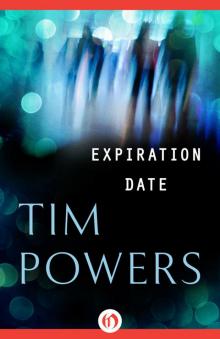 Expiration Date
Expiration Date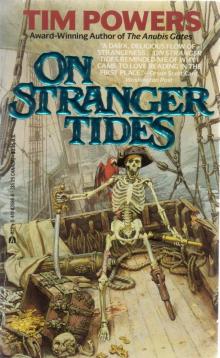 On Stranger Tides
On Stranger Tides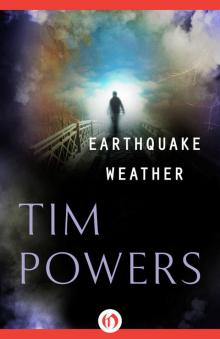 Earthquake Weather
Earthquake Weather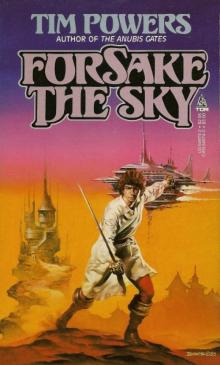 Forsake the Sky
Forsake the Sky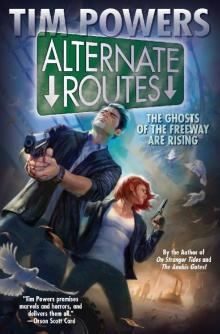 Alternate Routes
Alternate Routes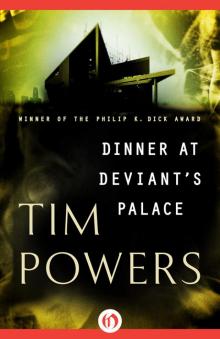 Dinner at Deviant's Palace
Dinner at Deviant's Palace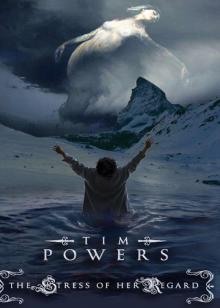 The Stress of Her Regard
The Stress of Her Regard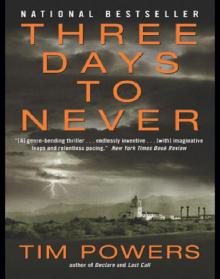 Three Days to Never: A Novel
Three Days to Never: A Novel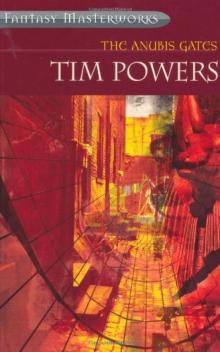 The Anubis Gates
The Anubis Gates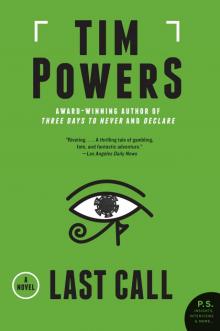 Last Call
Last Call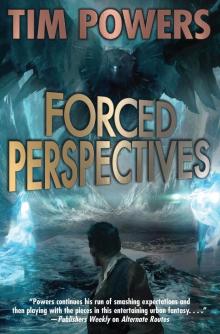 Forced Perspectives
Forced Perspectives Strange Itineraries
Strange Itineraries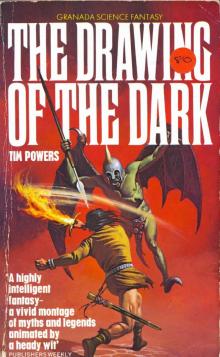 The Drawing of the Dark
The Drawing of the Dark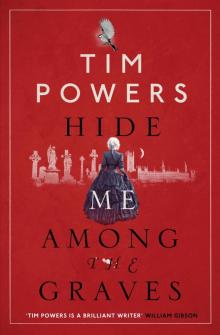 Hide Me Among the Graves
Hide Me Among the Graves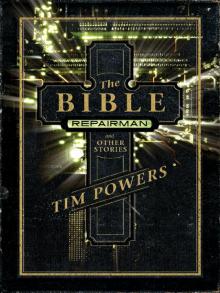 The Bible Repairman and Other Stories
The Bible Repairman and Other Stories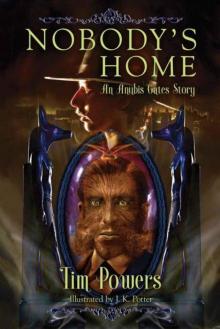 Nobody's Home: An Anubis Gates Story
Nobody's Home: An Anubis Gates Story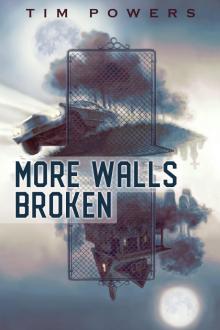 More Walls Broken
More Walls Broken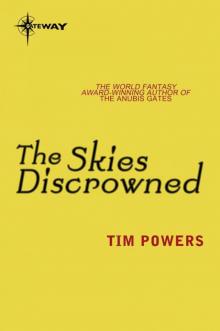 The Skies Discrowned
The Skies Discrowned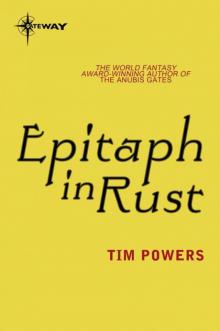 Epitaph in Rust
Epitaph in Rust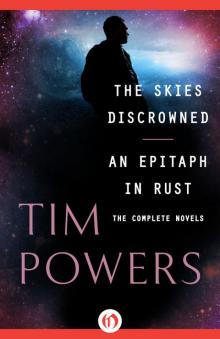 Skies Discrowned and An Epitaph in Rust
Skies Discrowned and An Epitaph in Rust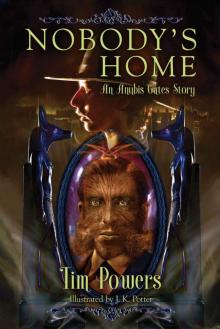 Nobody's Home
Nobody's Home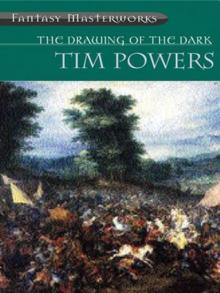 Drawing of the Dark
Drawing of the Dark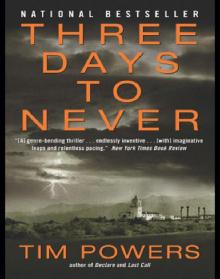 Three Days to Never
Three Days to Never